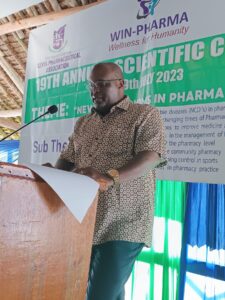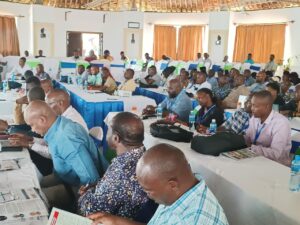S𝐭𝐫𝐞𝐧𝐠𝐭𝐡𝐞𝐧𝐢𝐧𝐠 𝐭𝐡𝐞 𝐏𝐡𝐚𝐫𝐦𝐚𝐜𝐲 𝐏𝐫𝐨𝐟𝐞𝐬𝐬𝐢𝐨𝐧 𝐢𝐧 𝐊𝐞𝐧𝐲𝐚: 𝐀 𝐂𝐚𝐥𝐥 𝐟𝐨𝐫 𝐂𝐨𝐥𝐥𝐚𝐛𝐨𝐫𝐚𝐭𝐢𝐨𝐧
Mombasa, KENYA – During the 19th Annual Pharmaceutical Conference, the Chief Executive Officer (CEO) of the Pharmacy and Poisons Board (PPB) highlighted the urgent need for collaboration to fortify the pharmacy profession in Kenya.
The conference, hosted by the Kenya Pharmaceutical Association, provided a platform for professionals and stakeholders committed to advancing the field.
The CEO, Dr. F. M. Siyoi whose speech was read by Dr. Dominic Mutie, Deputy Director of Pharmacy Practice and Training, began by reaffirming the PPB’s dedication to creating a conducive environment for pharmacy practice and regulation. Emphasizing the importance of a robust regulatory framework, the CEO underscored the need to ensure the safety, efficacy, and quality of pharmaceutical products reaching the citizens.
Addressing a significant challenge, the CEO urged all stakeholders to unite in eliminating unqualified individuals and quacks from the pharmaceutical field. Proposing “nyumba kumi” initiatives within communities, the call aimed to identify and remove such individuals, safeguarding the profession’s integrity and protecting the public from potential harm.
Aligned with the PPB’s mission to achieve WHO Level 3 maturity, the CEO emphasized the necessity of staying updated and compliant with guidelines. Delegates were encouraged to engage with the PPB’s new guidelines, particularly those concerning good distribution practices, transportation of pharmaceutical products, and proper pharmaceutical waste disposal.
Furthermore, the CEO called for a close partnership between the Kenya Pharmaceutical Association and the Pharmacy and Poisons Board at both national and regional levels. Such collaboration, he noted, would streamline efforts and efficiently address challenges facing the profession, creating a stronger, unified voice.
Adherence to pharmacy practice guidelines, especially concerning prescription medicines and controlled substances, was underscored as essential in maintaining public trust in healthcare providers. The delegates were reminded of the critical role designated superintendents play in ensuring the quality of services provided.
The conference also addressed critical issues affecting the profession, including the elevation of pharmaceutical services at level 4 hospitals and the upgrading of career conversion programs for pharmaceutical technologists. Additionally, the PPB is actively developing comprehensive Standards of Pharmacy Practice to promote professionalism across all sectors.



